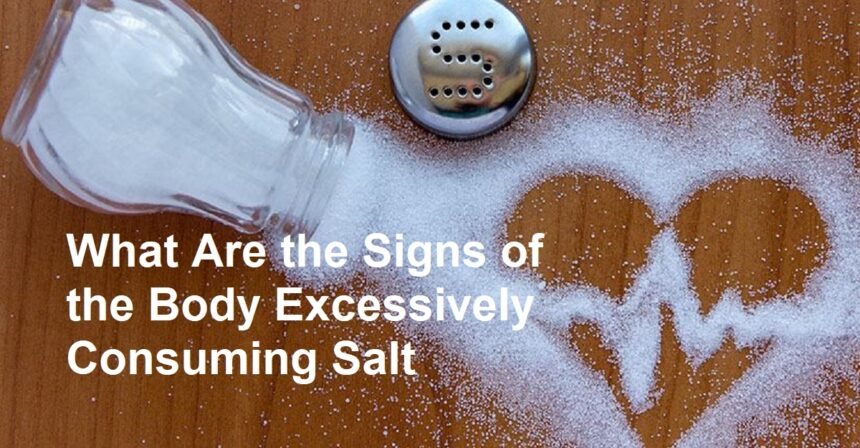Introducing
Salt, also known as sodium chloride, is an essential mineral that our bodies need in moderation for proper nerve function, muscle contractions, and fluid balance. However, in today’s world, many people consume salt in amounts far exceeding the recommended daily limit, mainly due to processed foods, fast food, and salty snacks. Excessive salt intake can lead to various health problems and bodily signs that indicate the body is overwhelmed by too much sodium. Recognizing these signs early can help you take corrective actions to maintain better health. Here are the key symptoms and signs that your body might be reacting to too much salt.
1. Swelling and Edema
One of the most immediate signs of excessive salt consumption is swelling, especially in the hands, feet, ankles, and face. Salt causes the body to retain water to balance out the sodium levels. When there’s too much salt, your kidneys struggle to excrete the excess, leading to fluid buildup.
What to look for:
- Puffiness around the eyes in the morning
- Swollen ankles or legs after a salty meal
- Puffiness or bloating that persists throughout the day
Reducing salt intake in your diet can help alleviate swelling and improve circulation.
2. High Blood Pressure
Salt is closely linked to hypertension or high blood pressure. When sodium levels are high, blood vessels narrow and stiffen, increasing the pressure inside them. Over time, this can lead to serious health issues like stroke, heart attack, or kidney problems.
What to look for:
- Persistent headaches
- Dizziness or lightheadedness
- Feelings of chest tightness or irregular heartbeat
Monitoring your blood pressure regularly can help you identify if excess salt is affecting your cardiovascular health.
3. Increased Thirst
Consuming too much salt makes your body crave water to dilute the sodium levels. As a result, you may find yourself feeling unusually thirsty, even after drinking enough fluids.
What to look for:
- Constantly needing to drink water or other beverages
- Dry mouth and throat
While staying hydrated is generally good, persistent thirst may be a signal to cut back on salt.
4. Kidney Strain and Dysfunction
High salt intake puts stress on your kidneys, the organs responsible for filtering excess sodium and other waste products from your blood. Over time, this strain can damage kidney function, leading to further health complications.
What to look for:
- Changes in urination, such as decreased urination or dark-colored urine
- Swelling in legs, ankles, or around the eyes due to fluid retention
- Elevated blood pressure
Maintaining balanced salt consumption can help preserve kidney health and overall well-being.
5. Loss of Bone Density
Emerging research suggests that excess salt may also negatively impact bone health. High sodium intake causes calcium to be leached from bones and excreted through urine, possibly leading to decreased bone density and increased risk of osteoporosis in the long run.
What to look for:
- Increased risk of fractures or bone pain
- Poor posture or back pain (indirect signs related to weakened bones)
Healthy bones require a balanced diet rich in calcium and vitamin D, combined with moderate salt intake.
6. Digestive Issues
Too much salt can upset the balance of your digestive system, leading to bloating, discomfort, or even nausea after meals.
What to look for:
- Persistent bloating or abdominal discomfort
- Feeling overly full or sluggish after eating salty foods
Limiting salt can support better digestion and overall gastrointestinal health.
7. Skin Problems
Excess salt can dehydrate your skin, leading to dryness, irritation, or dullness. It can also make skin prone to conditions like eczema or rashes.
What to look for:
- Dry patches or flakiness
- Increased skin sensitivity or irritation
Staying hydrated and reducing salt can improve your skin’s appearance and health.
8. Fatigue and Weakness
High sodium levels can cause imbalance in electrolytes, leading to muscle weakness, fatigue, or cramps. This is especially prevalent when salt consumption is combined with dehydration.
What to look for:
- Muscle cramps or spasms
- Feeling unusually tired or sluggish
Proper hydration and balanced electrolyte intake are vital for energy and physical strength.
Final Thoughts
While salt is a necessary mineral, consuming it excessively can lead to multiple health issues and bodily signs. Being aware of the symptoms—such as swelling, high blood pressure, thirst, and kidney strain—can alert you to reduce your salt intake and improve your












